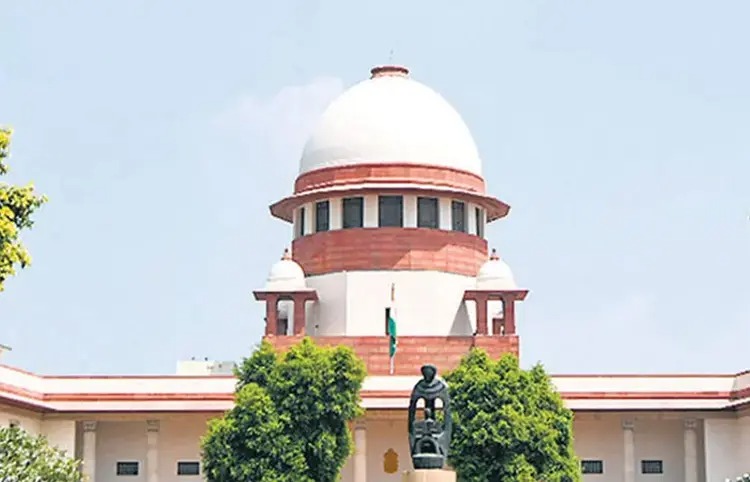
Worship Act Case: Hearing began in the Supreme Court on Wednesday on the petitions filed against the Places of Worship Act, 1991. Meanwhile, Chief Justice Sanjeev Khanna made it clear that no new case related to temple-mosque will be filed till the next hearing in this matter. We want to clarify that no new application can be filed till the next hearing. We request all the parties to keep their arguments ready so that the matter can be disposed of quickly.
It is noteworthy that the Supreme Court today heard the petitions challenging the Places of Worship Act 1991. A special bench of Chief Justice Sanjiv Khanna, Justice Sanjay Kumar and Justice KV Vishwanathan is hearing the case.
The Places of Worship Act, 1991 protects the status of places of worship as of 15 August 1947 and prohibits changes to it. However, the Act excluded the Ram Janmabhoomi-Babri Masjid dispute in Ayodhya. On the other hand, the Supreme Court has fixed the date for the next hearing of the case and has directed to maintain the status quo till then.
Arguments of the central government during the hearing
On behalf of the Central Government, Solicitor General Tushar Mehta said that we will file an affidavit on this issue.
The Chief Justice directed the Center to file a reply in this matter.
Important comments of the Chief Justice
The matter will not be heard in detail as it is still pending.
No new application will be filed in the matter of place of worship law.
The Chief Justice said that many questions have been raised, on which the court will hear.
Important arguments raised by the petitioners
Senior lawyer Raju Ramachandran said that a total of 10 petitions have been filed in various courts and further hearing should be stayed.
Central government protested
The central government opposed this demand. SG Tushar Mehta said, how can any private party demand a stay on the application.
Muslim side also argued
The Muslim side said that 18 cases have been registered at 10 places across the country. Therefore, we request that the hearing of all the cases should be postponed until the Supreme Court’s decision on the Places of Worship Act is reached.
Major pending cases under this Act
The Supreme Court said that the Mathura case and two other cases are already pending in the court.
Demand to repeal the place of worship law
BJP leader and lawyer Ashwini Upadhyay has filed a PIL demanding that the Places of Worship Act be repealed so as to right the wrongs of history and the destruction of places of worship and pilgrimage sites of other religions by Islamic rulers in the past. . The construction of Islamic structures on them should be handed back to those who are its real owners.
The petition states that the provision of the Places of Worship Act, 1991 is arbitrary and unconstitutional. This violates Articles 14, 15, 21, 25, 26 and 29 of the provision. The Places of Worship Act 1991 interferes with the Constitution’s right to equality, right to life and right to religious freedom.
Apart from this, it has been claimed that the Central Government has made this law beyond its jurisdiction. Worship and religious matters are state subjects and the Central Government has made arbitrary laws in this regard. Muslim rule in India Established in 1192, India remained under foreign rule until 1947 when Mohammad Ghori defeated Prithviraj Chauhan. So if there is any cut-off date to keep the character of a religious place intact, it is ES. Should be 1192. After that, thousands of temples and shrines of Hindus, Buddhists and Jains were destroyed and Muslim rulers damaged them and converted them into mosques.
What is the Places of Worship Act?
The then Narasimha Rao government of the country had enacted the Places of Worship Act in 1991. The purpose of introducing this law was to suppress the increasing intensity and ferocity of the Ayodhya Ram Janmabhoomi movement. The government has made a provision in the law that apart from the Babri Masjid in Ayodhya, claims of people of other religions will not be accepted at any place of worship in the country. It says that on the day of the country’s independence i.e. 15 August 1947, no religious structure or place of worship, in whatever form, can be claimed by people of other religions.
In this Act, Babri Masjid of Ayodhya was singled out and made an exception, as this dispute was already pending in the courts before independence. It was said in this law that the religious place which belonged to the sect on August 15, 1947, will remain the same today and in the future also. However, the Ayodhya dispute should be kept out of it as there was already a legal dispute over it.
One such petition has been filed by the priest union through lawyer Vishnu Shankar Jain. In this PIL, the Supreme Court has also been requested to repeal the Places of Worship Act, 1991. So that the dispute between Krishna’s birthplace in Mathura and Kashi Vishwanath Temple-Mosque in Varanasi can be resolved. Vishwa Bhadra Pujari Purohit Mahasangh, an organization of Hindu priests, has challenged this provision of the Act.
The petition states that this law has never been challenged and no court has given judicial consideration to it. Even in the Ayodhya verdict, the Constitution Bench had only commented on this. However, Muslim organization Jamiat Ulama-e-Hind has strongly opposed this petition. He told the Supreme Court that the petition was a fraudulent attempt to correct the wrongs of history. It warned that if the Supreme Court takes interest in this, there will be a flood of cases and petitions in the country.
In this petition, various petitions have been opposed and it has been said that the court should not issue notice on this petition. The issuance of the notice, especially after the Ayodhya dispute, will create fear in the minds of the Muslim community regarding their places of worship. This case will destroy the secular fabric of the country. In the petition, a request has been made to make him also a party in this case.
Let us tell you that on this law of 1991, the Supreme Court had said in its 1,045-page decision on the Ayodhya Ram Janmabhoomi dispute that this law guarantees the protection of the religious character of places of public worship on August 15, 1947. And against change. The Supreme Court said that the law assures every religious community that their places of worship will remain safe and no changes will be made in them. The Places of Worship Act is a provision of legislation to preserve the religious character of places of worship, making it an essential aspect of our secular values. This is a good law.
 look news india
look news india
